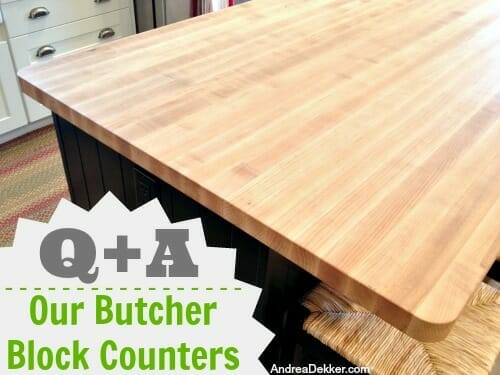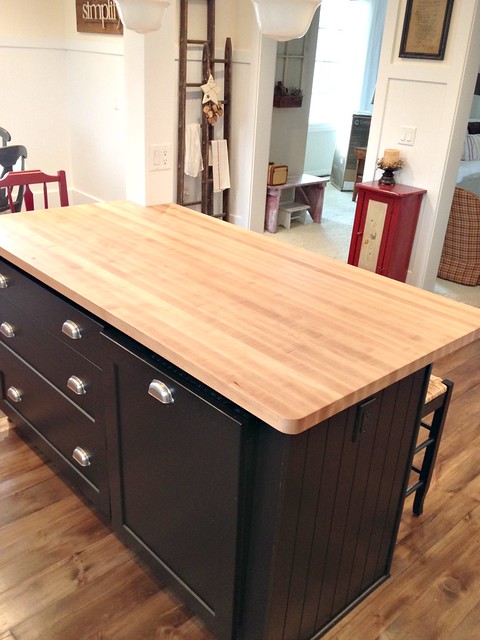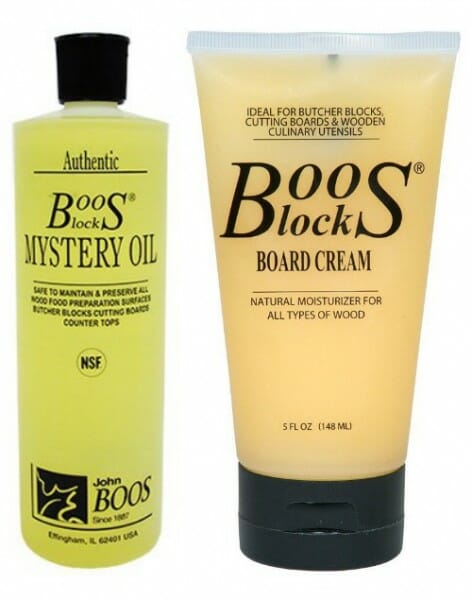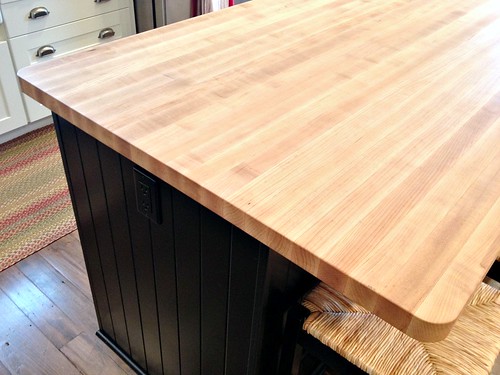
Ever since we finished our kitchen renovation (summer of 2012) I’ve gotten lots of questions about our butcher block island counter top. I’ve answered all the emails and many of the comments — but I’ve put off doing a blog post on the topic as I wanted to make sure I actually knew what I was talking about 🙂
So after almost 2 years of caring for our butcher block counter (and after a couple conversations with the company we purchased it from) I feel like I’m able to answer some of those questions.
Below are my answers to some of the questions I’ve gotten over and over again.
Where did we purchase our butcher block?
We looked around for a long time and ended up going with a local company, Tontin Lumber. They get most of the wood for their counters from West Michigan trees — so that was cool for us. They are also only about 20 minutes from our house so I could go to their shop and actually meet them, see their work, etc.
Another reason we had to go to a more local/custom shop is because out counter is 38″ deep — and most “big box” stores like IKEA, Lowe’s, Home Depot, etc. can only go up to 36″. We didn’t realize this when we were creating our kitchen, otherwise we maybe would have gone with a 36″ deep counter top to save money (see below for cost breakdown). However, I’m 100% positive the quality of our counter is so much better — not to mention it’s totally custom built to my exact specifications and for our specific kitchen needs.
What size is your counter?
Our island is actually a pretty good size. It’s 38″ deep by 72″ wide, and it’s 2″ thick.
Also, since we took out the load-bearing wall between our kitchen and dining room, we had to install a HUGE beam in the ceiling… and then we needed support that beam with a post. We figured out a way to tie that post into our island so it didn’t look totally ridiculous — but that meant we needed a custom cut-out in the corner of our island.
Fortunately, Tontin could do that for us, no problem!
How much did it cost?
We paid cash, so we got a deal — but even still, it cost around $800 for the counter and delivery.
It would have been about half the price if we could have ordered something 36″ deep from a big box store, but again, I feel the quality and “customness” of our counter probably makes up for the price difference.
Also, I’ve been to some kitchen home shows and I’ve seen butcher block counter tops that are WAY WAY WAY more expensive than ours. Like thousands and thousands of dollars! So I feel like $800 in the grand scheme of our kitchen is pretty reasonable.
What do you need to do to care for it?
When we were renovating our kitchen, I knew that I really wanted the island counter to be butcher block. The only thing I was initially a bit hesitant about was how much work it would be to maintain.
The guys at Tontin Lumber assured me that it was not a difficult process and just required very minimal maintenance a few times a year. I figured I could do that — and honestly it’s not bad at all.
Since the island is where we do most of our food prep each day, I’m always wiping it down with a cloth and warm water. Also, when I wash dishes, I always take some of the clean, warm, soapy water and really wipe it down.
The main thing with butcher block counters is to make sure they don’t get too dry. So every couple of months (or whenever I remember and/or whenever I notice it’s getting dry) I use Boos Mystery Oil and Board Cream. The oil is a food safe oil that’s a mixture of mineral oil, linseed oil, and tung oil. The Board Cream is a special combination of natural unbleached beeswax and food grade mineral oil.
First I wipe down the counter to make sure it’s clean. Then I rub the oil into the board with a rag or paper towel. After 5-10 minutes, I “massage” a good amount of the board cream into the wood with my hands.
The whole process takes less than 30 minutes (including the 10 minutes of waiting) and the counter looks brand new every time I do this — plus, my hands are super soft and moisturized.
Oh and one more thing. If you ever do get huge gouges, cuts, etc. in the board, all you need to do is sand it down maybe 1/16 of an inch and you have a brand-new looking board!
Is it sanitary?
I’ll be the first to admit that I think using wooden cutting boards is totally gross (and I don’t ever use them). I realize that the wood cutting boards are better for your knives — but I just can’t do it!
That said, I honesty have no issue with our butcher block counter. I know, I’m weird.
Obviously I don’t needlessly rub uncooked meats or other unsanitary items on our counter. I also do use a cutting board most of the time, just to keep the counters cleaner, and looking new.
I’m told (by multiple reliable sources) that butcher block is actually much more sanitary that we might think. And that by simply keeping it oiled and not letting it dry out, it actually is quite sanitary.
I haven’t personally done any germ testing on our counter — so take this information for what it’s worth 🙂
Are we still happy with our purchase?
Yes! Not only do I absolutely LOVE how it looks in the center of our kitchen, I really like how it functions too.
The one thing we noticed almost immediately is how “quiet” the butcher block is — especially compared to our other granite counters. The wood absorbs the sound of dishes, glasses, sliver ware, etc. so it makes loading and unloading the dishwasher a much quieter task than if we had granite on the island.
While I don’t think I’d ever want butcher block counters in my entire kitchen, I do REALLY like having it for our center island.
Is there anything we don’t like about them?
Honestly, no. Besides the few minutes it takes me to rub a little oil on them every few months, they don’t require any extra work.
I can’t believe it’s been almost 2 years since our kitchen renovations! Dave and I are both so happy with how it turned out (and that it’s done!) and we both really like how the butcher block island counter is the center of the kitchen.
It visually warms up the space and provides the perfect gathering spot for friends and family to be near me while I cook — but still out of my way 🙂
If you have more questions about our counter, leave them in the comments and I’ll do my best to answer them all.





Christie Datson says
Hey Andrea, do you know much about this stuff called Walrus Oil to finish the counters? http://walrusoil.com I’ve used Boos on other stuff in the past and would have to reapply it a lot but I’ve heard that this walrus stuff actually lasts a lot longer. I guess maybe there might be no way around it, if its natural, it will have to be reapplied eventually.
Andrea says
I’ve actually never heard of this oil — but I’m definitely going to look into it now 🙂
Kaitlin @ The Mom on Purpose says
Hey Andrea! We are about to do a partial kitchen renovation and butcher block countertops are at the top of my wish list! 🙂 I’ve been reading a lot about them (pros/cons/maintenance/etc.) I’ve read that many people use a product called Waterlox on their counters. Have you ever used this? Or would this product possibly be in place of the oil you use?
Thanks for any help you can give me! 🙂
Lisa Worland says
What type of wood is your butcher block counter top?
Andrea says
I honestly don’t know! It’s all local West Michigan wood though!
Ladybug27 says
just wondering if the butcher block island is movable? Storage space underneath? If so what items do you place there? Measurements?
Michelle says
Our builder made us a butcher block counter for our island. It is gorgeous but we can’t set anything damp (like a glass with condensation) on it without it leaving a mark. Have you experienced this at all? It is annoying not to be able to fully use it.
Andrea says
hmmm… I’m not sure Michelle. We’ve never had that problem. I wondering if you need to get a bunch of oil on it as it might be too dry?
Here’s how we take care of our counter.
Sandra says
Hi Andrea,
I think $800 is a real deal; I would expect a quality counter to be 2000-3000K
Leigh says
We updated our 1966 kitchen with butcher block countertops earlier this year and I absolutely adore them. It very much suits the style of the house and granite would have been over-improving for the neighborhood. It looks awesome with white cabinets and dark pulls. Highly recommend.
Ashley B says
Andrea–check this out. Might make you feel even better about your butcher block! 🙂
http://www.commonsensehome.com/wooden-cutting-boards/
Andrea says
Awesome Ashley. I know tons of people have told me about wood cutting boards but I actually never read the “ins and outs” of WHY they are better before. This was a great read… thanks!
Jenni/Life from the Roof says
Wow, I can’t believe it’s been 2 years already since you remodeled your kitchen! I’m glad it’s worked so well for you. I have also heard that wood has more anti-bacterial properties than other finishes. Your comment about not rubbing meat all over the countertop made me laugh, but I know for me that is not the problem, more that meat juices spill and spatter sometimes. But again, if all your food prep is on cutting boards, it wouldn’t be as much of a problem as people say it is.
Janice says
Why do you think you would never want butcher block countertops? Aren’t they cheaper than the granite, etc? We need to update our 1970s kitchen and I don’t think we can afford the granite or whatever new 21st century styles are out there.
Andrea says
just personal preference I guess. I love the look and feel of granite counters and I like contrast — so butcher block for the island and granite for everything else seemed to work well in our space. Plus, wood is more maintenance. When it comes to a huge kitchen renovation, the little bit extra granite would cost really doesn’t amount to anything — so the cost factor didn’t matter that much to us either.